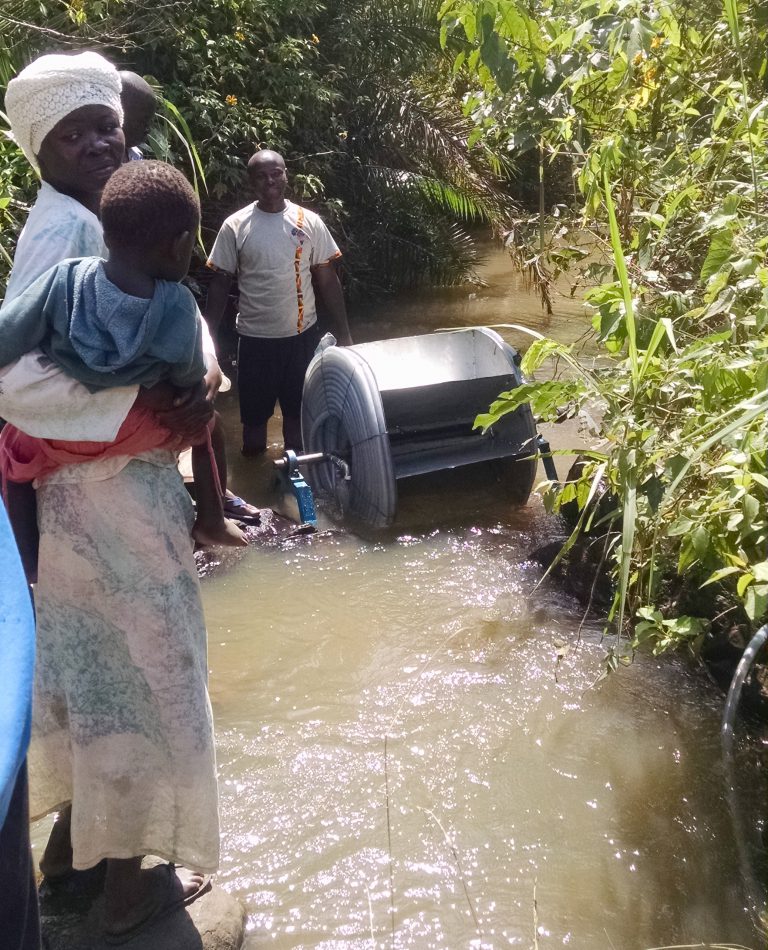

Editor’s note: Julia Jordan is one of two UC Davis graduate students (along with Mariah Coley) who have been working on a Horticulture Innovation Lab project in Uganda with support from Research and Innovation Fellowship for Agriculture (RIFA). As a RIFA fellow, she worked in Uganda for 5 months alongside the Teso Women’s Development Initiative and Busitema University students in relation to a project focused on developing farmer-led irrigation solutions, with leadership from Kate Scow of UC Davis. Julia previously worked as a graduate assistant with the Horticulture Innovation Lab’s management team at UC Davis.
Below is an excerpt of a blog post that Julia wrote about her work on this project, a version of which has also been shared on the Agrilinks website.
Under the shade of a mango tree on a cool Monday morning in Soroti, Uganda, ten Busitema University student interns gathered and looked around apprehensively. They were seated on bright blue plastic chairs outside of the Teso Women’s Development Initiative (TEWDI) office, where they had been meeting for weeks as part of their internships with a research project focused on developing farmer-led irrigation solutions.
The group of crop science, agricultural mechanization, and irrigation engineering majors had just been asked to brainstorm and write down the qualities, roles and expectations they associate with women and those they associate with men. Though initially confused by the exercise, the students were soon furiously scribbling their ideas on a colorful array of sticky notes and, shortly after, engaged in a lively discussion about the gender norms and relationships they have witnessed, experienced, or heard about in their own communities.
These soon-to-be professionals, many of whom hail from rural farm families and villages in various regions of Uganda, debated pervasive assumptions about men’s superior physical strength, contemplated what it means for a woman to be expected to “submit” to her husband, and described the perceived threat of a woman attaining a higher education level than a man. They reflected on women’s responsibility to collect firewood and water, men’s tendency to manage cattle, and why it may be more common to see women riding bicycles in some regions rather than others. I encouraged the students to also consider how age, ethnicity, disability status, religion, and other social differences may influence these issues.
“So,” I asked them, “what does all of this have to do with designing irrigation technology?”
Water management, thinking beyond technology
This project is a partnership between the University of California, Davis, TEWDI, Busitema University, farmer groups, engineers, and government agencies to conduct participatory research and development activities in dry-season horticulture, with a focus on small-scale irrigation and water management.
Busitema University students, interns, and project assistants have played a significant role in the participatory development of low-cost, easy-to-use, small-scale irrigation technologies for the six vegetable-growing sites for this project. “Technology” in this context simply means the tools and infrastructure that farmers use to access, distribute, and apply water. The students work directly alongside farmers and other project team members in the fields, putting into practice what they learn in the classroom to design and implement these innovations, such as a zero-energy water wheel pump, a low-cost land leveling tool, and an efficient canal system, all of which can be constructed and maintained with locally available materials.

Rather than concentrate solely on the technical and engineering aspects of irrigation, the interdisciplinary project team also emphasizes the social elements of irrigation development. The project aims to understand and address site-specific issues that enable or constrain farmers’ ability to use and benefit from irrigation, including systems of local governance, gender norms and access to land, water, labor, and time.
The meaningful engagement of women and men farmers in the participatory design, planning, training and implementation of irrigation systems has remained is a priority, encouraging shared decision-making, group cooperation, and equitable access to irrigation resources and benefits.
Read the rest of Julia’s story from Uganda on the RIFA website.
More information:
- Project information: Developing farmer-led irrigation solutions in Uganda
- Related blog post: Ugandan president commends students for irrigation innovation
- Related blog post: Irrigation solutions in Uganda require social science and farmer-led innovation
- More about Teso Women’s Development Initiative (TEWDI)
- More about the RIFA fellowship program
- More about the Global Center for Food Systems Innovation
This project is supported by the Horticulture Innovation Lab (based at UC Davis) and the Global Center for Food Systems Innovation (based at Michigan State University) with funding from the U.S. Agency for International Development, as part of the U.S. government’s global hunger and food security initiative called Feed the Future.
